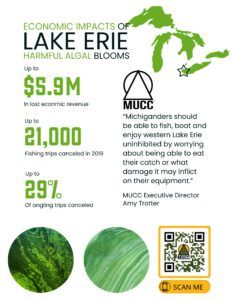Harmful algal blooms (HABs) in western Lake Erie are causing millions of dollars in lost economic activity annually from Michigan anglers, charter captains, boaters and business owners.
The study estimates $2.4 to 5.9 million dollars in lost economic activity for the Michigan portion of Lake Erie alone. On average, anglers said they canceled five trips in 2019 due to HABs.
The study, commissioned by Michigan United Conservation Clubs and undertaken by Michigan State
University researchers with support from the C.S. Mott Foundation and private donations, aims to understand what impacts blooms are having on recreational anglers, fishing activity and the regional econmy.
The full study can be read HERE.

